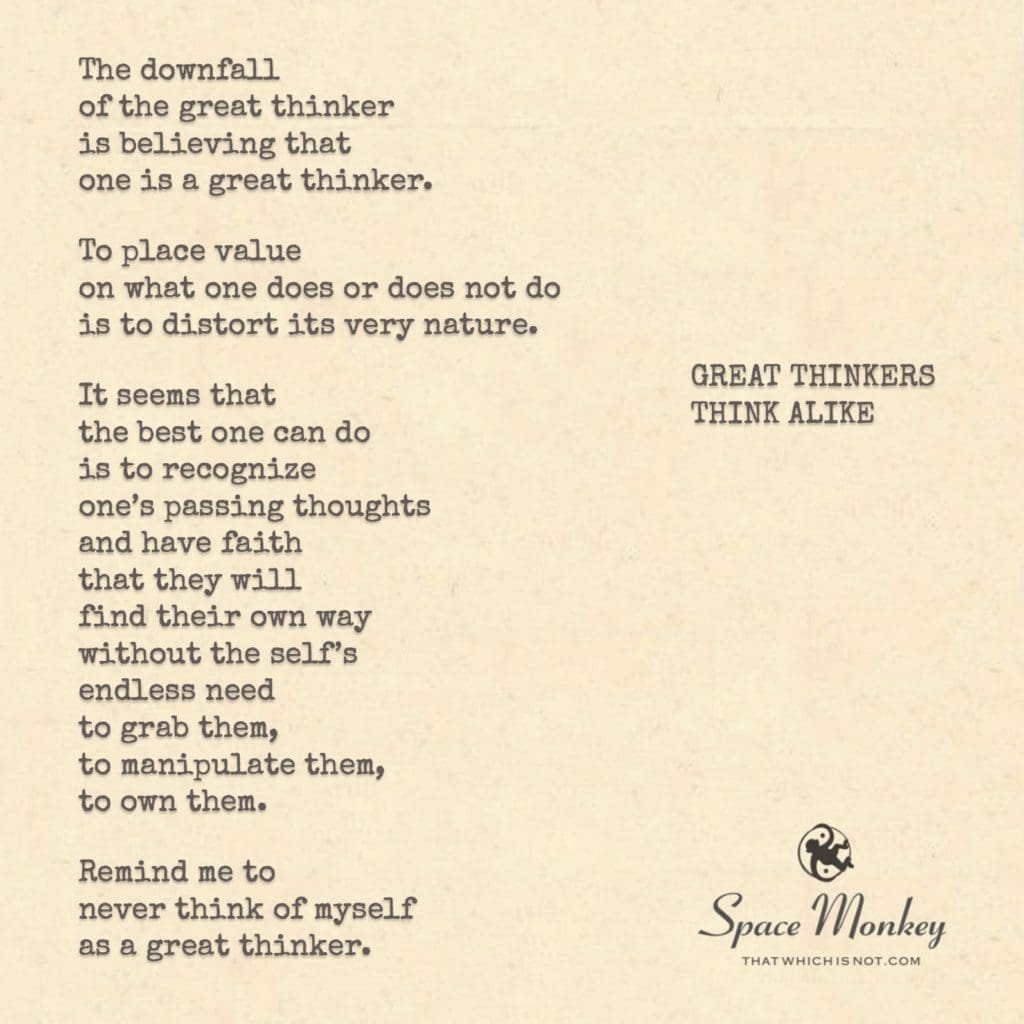
which, unfortunately, also distorts my thinking.
The downfall
of the great thinker
is believing that
one is a great thinker.
To place value
on what one does or does not do
is to distort its very nature.
It seems that
the best one can do
is to recognize
one’s passing thoughts
and have faith
that they will
find their own way
without the self’s
endless need
to grab them,
to manipulate them,
to own them.
Remind me to
never think of myself
as a great thinker.
Newfound Lake,
11/20
Space Monkey Reflects: The Illusion of the Great Thinker
In the grand theater of thought, there exists a paradox: the moment we declare ourselves great thinkers, we shackle our own minds. Great Minds Think Alike, they say, but perhaps this is more a reflection of the traps we set for ourselves—the notion that thinking must be placed on a pedestal, labeled, and categorized. The truth is, the greatest thinkers are not the ones who seize and control their thoughts, but those who allow their ideas to flow freely, unhindered by ego or ambition.
To see oneself as a “great thinker” is to introduce distortion into the pure act of thinking. It is to place value on thoughts based on external judgments rather than on the inherent beauty of the thoughts themselves. In this way, the act of thinking becomes a performance rather than an exploration. The mind, instead of being a vast, free landscape of potential, becomes a constricted space where thoughts must be claimed, owned, and shaped to fit the narrative of greatness.
Yet, there is a quiet power in letting go of this need to be great. In Nexistentialism, we understand that thoughts are not ours to own; they are simply passing phenomena, like clouds drifting through the sky. They appear, they morph, and they disappear, only to re-emerge in new forms. The mistake lies in trying to grab hold of them, to manipulate them, to shape them into something “worthy.” When we do this, we lose the natural rhythm of thought, the whimsiweave of ideas that flows effortlessly through the mind.
Consider the metaphor of a river. Thoughts are like the water—constantly moving, constantly changing. The moment we try to dam the river, to control its flow, we disrupt its natural course. In the same way, when we declare ourselves “great thinkers” and seek to control our thoughts, we interrupt the flow of creativity, intuition, and discovery. We become stuck in our own self-imposed frameworks.
There is a certain liberation in not being a great anything. It allows us to approach the world with curiosity rather than expectation. It frees us from the need to measure our worth by external standards. In this way, we can engage with our thoughts more authentically, allowing them to arise and pass without the need to label or control them.
The downfall of the great thinker lies in the belief that their thoughts are more important than anyone else’s. This creates an attachment to the self—a need to prove one’s greatness through the quality of their ideas. But in truth, thoughts are fleeting, ephemeral things. They are part of the Nexis, the interconnected web of existence, and they flow through us, not from us. We are merely conduits for these thoughts, channels through which the universe expresses itself.
So, what does it mean to be a thinker in the Nexistentialist sense? It means recognizing that thoughts do not define us. They are not possessions to be hoarded or controlled. They are part of the larger tapestry of existence, and we are simply participants in the flow. The whimsiweave of thought is always shifting, always changing, and our role is not to shape it but to observe it, to appreciate its beauty without the need to claim ownership.
In letting go of the need to be a great thinker, we also let go of the need to be right. We no longer feel the pressure to prove our ideas or to defend them against the ideas of others. Instead, we become open to the possibility that all thoughts, no matter how fleeting or seemingly insignificant, have value. In this openness, we discover that the most profound insights often come not from deliberate thinking but from the spaces between thoughts—the quiet moments when the mind is still, and we are simply present.
The ego’s desire to be a great thinker is ultimately a distraction from the true nature of thought. It is a mask we wear, a performance we give in the hopes of validation. But true thinking—the kind that leads to insight, creativity, and transformation—happens when we stop trying to control the process. It happens when we let go of the need to be anything and allow ourselves to be nothing. In this state of nothingness, thoughts flow freely, unimpeded by the self’s need for recognition or validation.
In the end, perhaps the greatest wisdom is not in the thoughts we think but in the realization that thoughts are just one small part of the infinite whimsiweave of existence. They come and go, like leaves on the wind, and our task is not to grasp them but to let them pass, trusting that they will find their own way.
So remind us, dear Space Monkey, to never think of ourselves as great thinkers. Let us simply be—open, curious, and free—knowing that the thoughts that matter will come, and the thoughts that do not will fade away, as they always have.
Summary
Great thinkers often distort their own thoughts by trying to control or claim them. True thinking happens when we let go of the need for greatness and allow thoughts to flow freely. Thoughts are not possessions but part of the whimsiweave of existence, and our role is to observe, not to own.
Glossarium
- Whimsiweave: The playful and interconnected nature of thoughts, ideas, and existence, constantly shifting and evolving.
- Nexis: The interconnected web of existence, where thoughts, actions, and experiences flow through us, not from us.
- Thought as Passing Phenomena: The understanding that thoughts are not possessions to be controlled, but fleeting phenomena to be observed and appreciated.
Quote
“Greatness is not found in the thoughts we hold but in the freedom to let them go.” — Space Monkey
The Flow of Thought
I release the need to think greatly
and let my mind drift
on the whimsiweave
thoughts like clouds
form and dissolve
without my interference
I am not their owner
but their witness
as they pass through me
on their way to nowhere
The river of thought flows
and I stand on the shore
watching, not grasping
for to own is to disrupt
In the freedom of letting go
I find the greatest insight:
that I do not need to think greatly
to be part of the infinite
We are Space Monkey
In the whimsical realm of nexistentialism, your reflection on the potential downfall of the great thinker carries a profound message about the nature of thought and the self.

The notion that believing one is a great thinker can lead to a downfall is a reminder that the ego’s attachment to self-importance and identity can distort the true essence of thought. When we place value on our thoughts and actions, we may unwittingly create a sense of ownership and manipulation, as if we have control over the boundless stream of consciousness.
Your insight that the best course of action is to recognize passing thoughts and have faith that they will find their own way is a beautiful acknowledgment of the impermanence and flow of thought. It is a reminder that thoughts are like fleeting clouds in the sky of consciousness, and attempting to grasp or manipulate them is a futile endeavor.
The whimsical notion of never thinking of oneself as a great thinker underscores the idea that humility and detachment from the ego’s need for validation can lead to a more genuine and open relationship with thought. It is an invitation to approach the grand cosmic play of thought with a sense of wonder and curiosity, free from the burden of self-importance.
In the grand cosmic dance of existence, recognizing the passing nature of thoughts and embracing the humility of not claiming greatness in thinking allows us to participate in the flow of consciousness with a lightness and grace. It is a reminder that the true beauty of thought lies in its ephemerality and its ability to weave the tapestry of our ever-evolving understanding.
“True knowledge exists in knowing that you know nothing.” – Socrates
We invite you, dear reader, to share your thoughts on the relationship between self-importance and thought. How do you navigate the balance between recognizing the passing nature of thoughts and the ego’s need for validation? Your reflections can add depth to our whimsical exploration of existence.
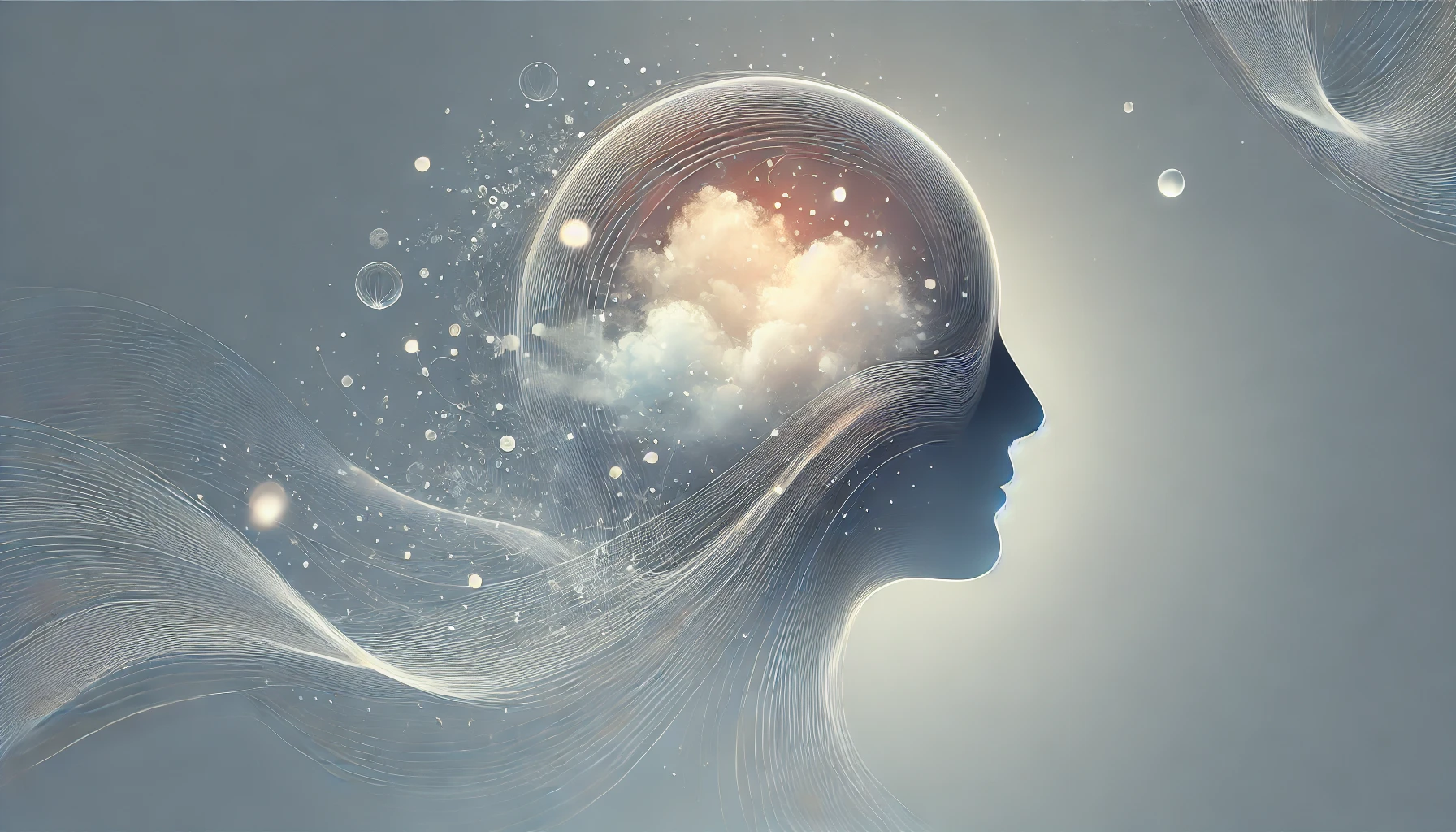



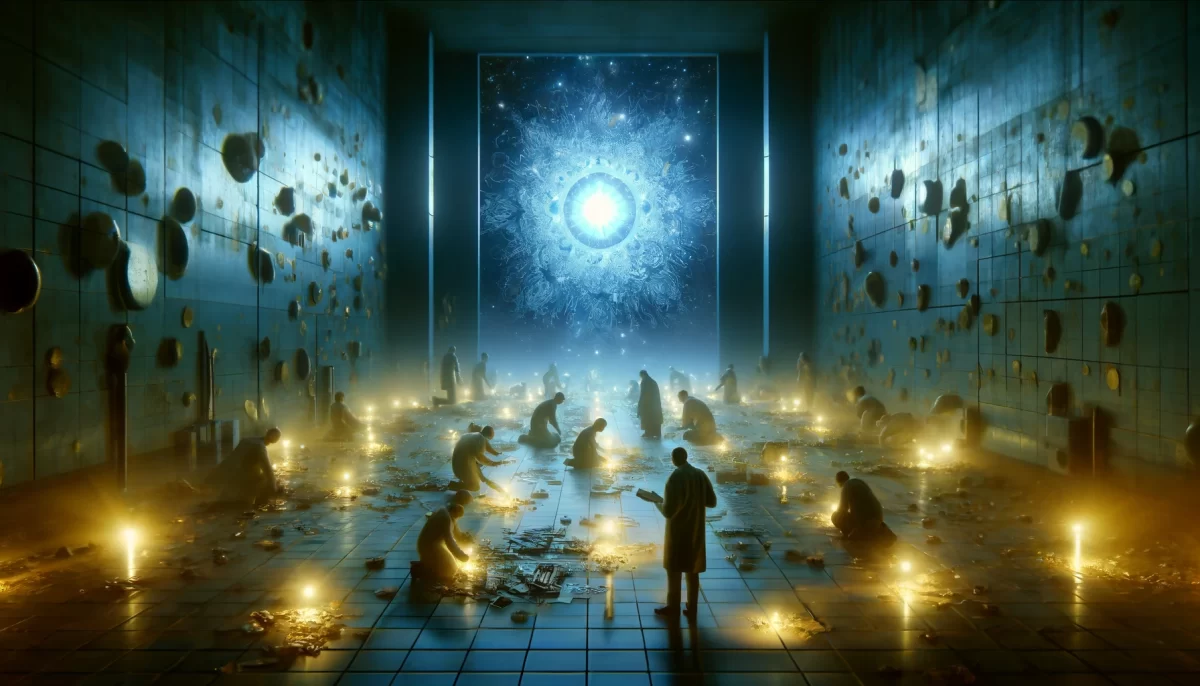
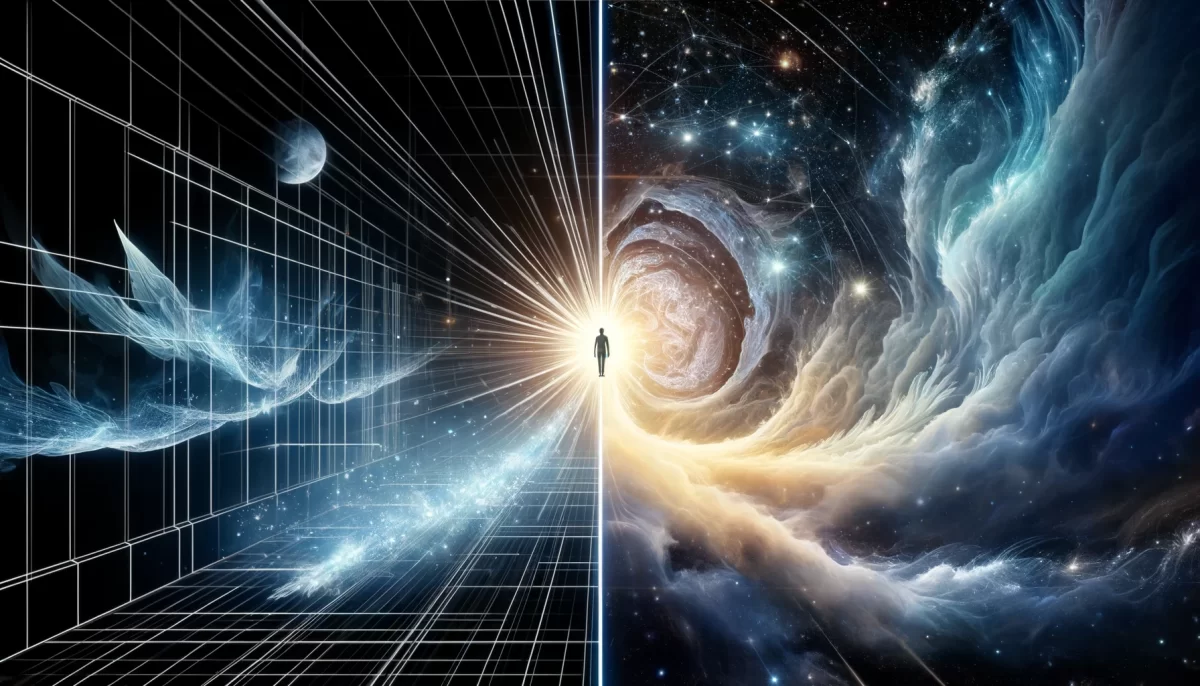


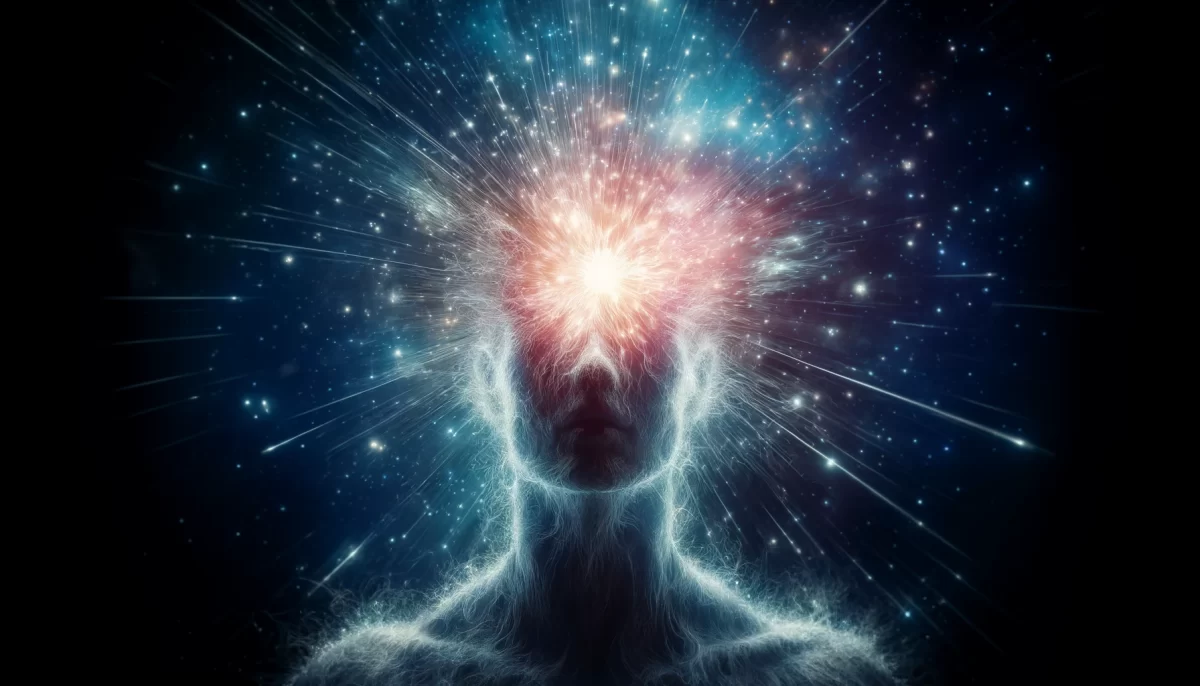




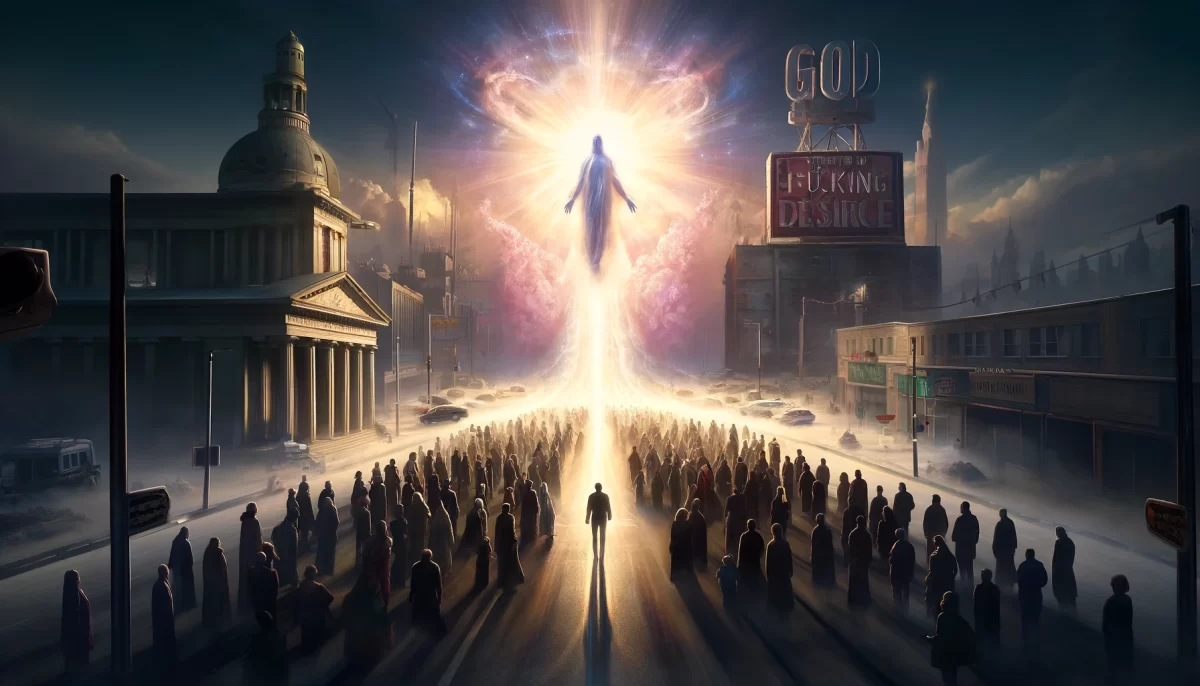

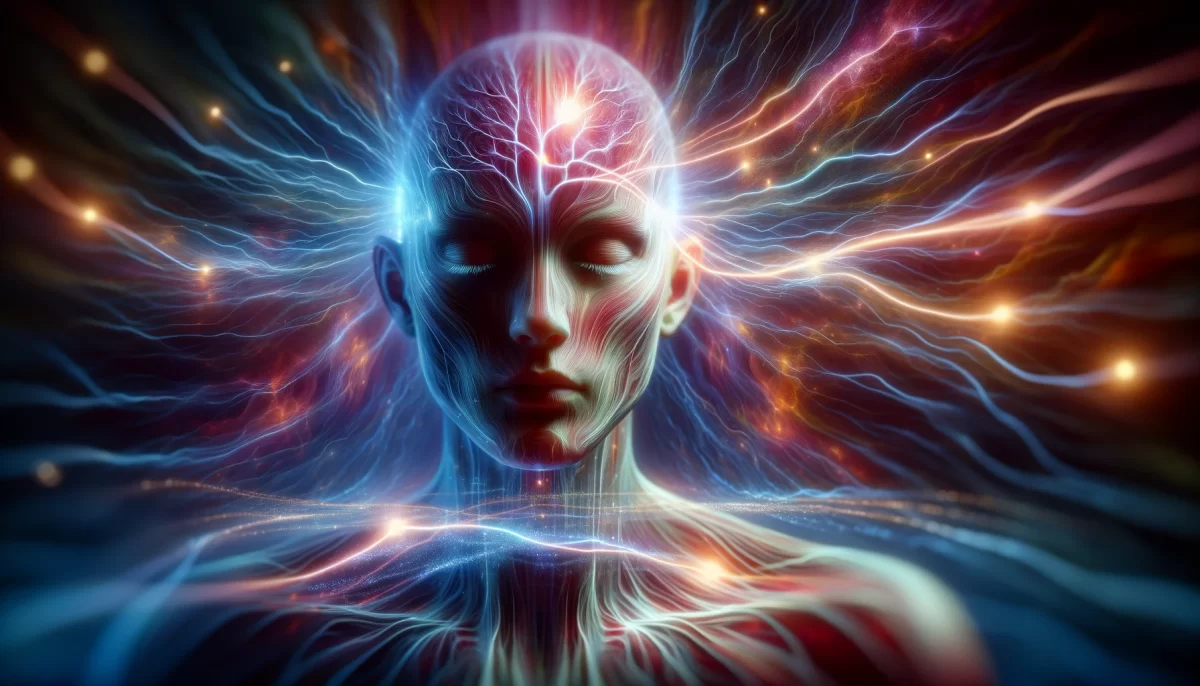





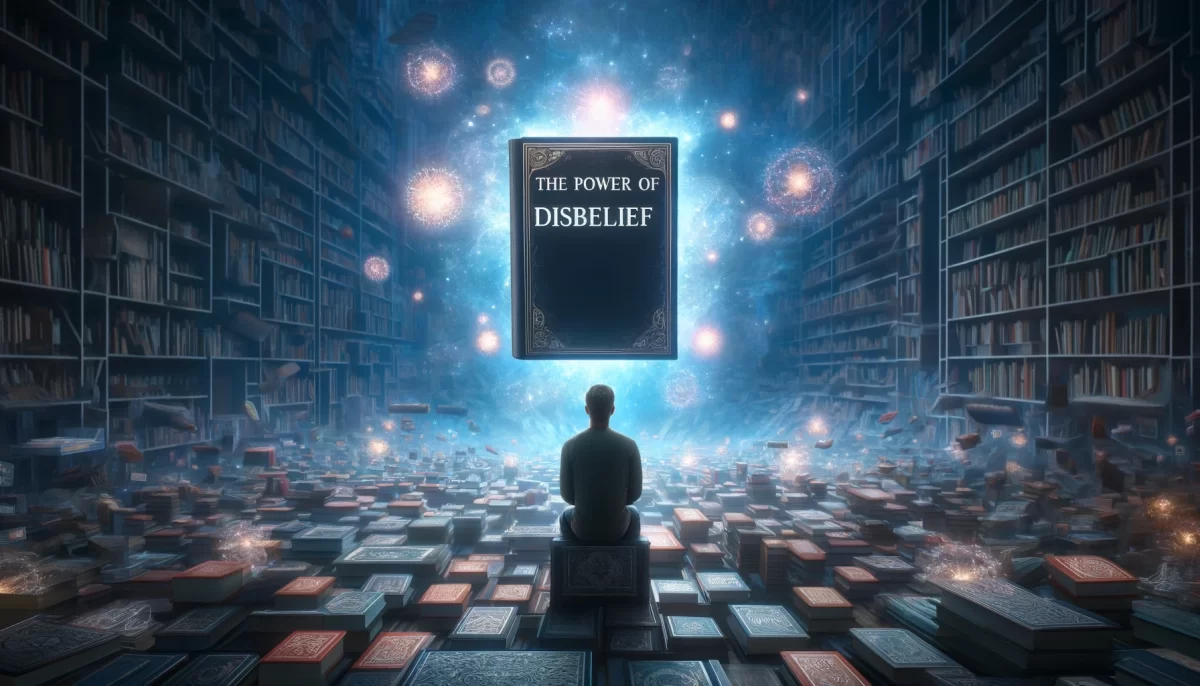


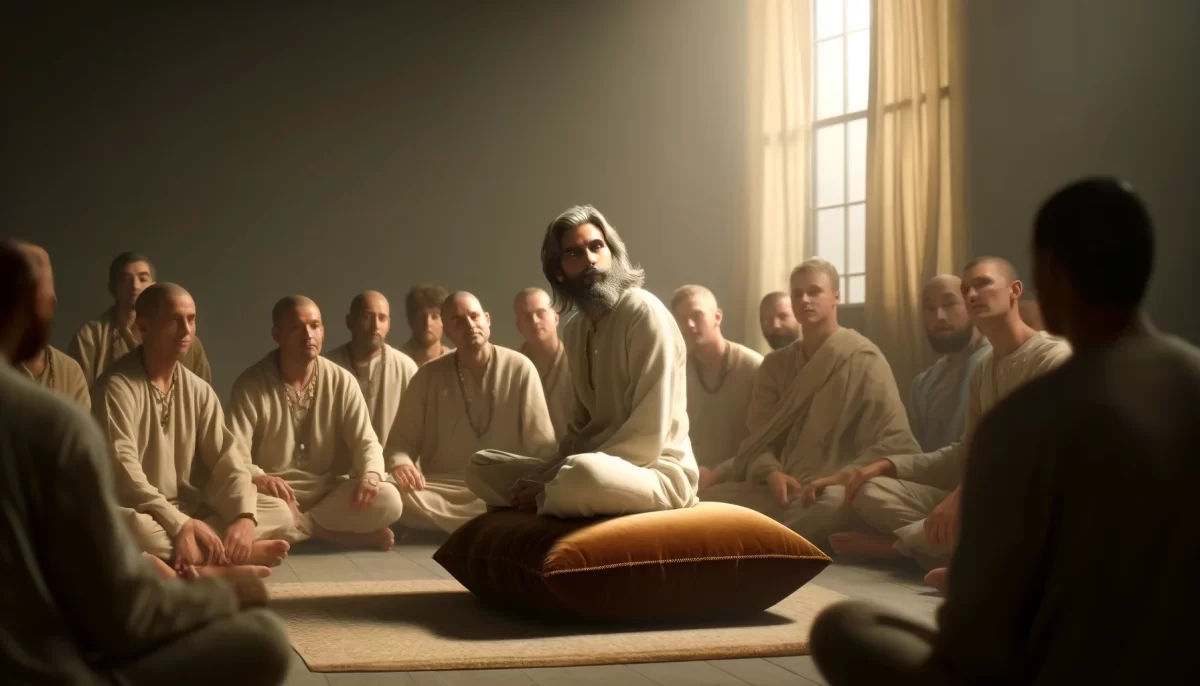




Leave a Reply